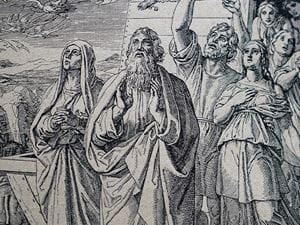
Regarding biblical stories, Noah’s is one of the most well-known tales in the world. In the Old Testament, he was a respectful servant of God who found favor in a sinful world. Noah is best known for building the ark that saved him, his family, and representatives of each land animal from the Great Flood that God released in judgment upon the earth.
We first learn about Noah in Genesis 5, described as the book of Adam’s generation. Genesis 5:28-29 tells us that at 182 years old, Lamech had a son who he named Noah. According to Lamech, Noah would comfort them in the painful labor of their hands caused by the ground that the Lord cursed.
Noah’s story.
From the beginning, we recognize that Noah is going to be unique. When God realized how corrupt and evil man had become, He regretted His creation and wanted to destroy humanity, according to Genesis 6:7. However, God showed favor to Noah because he recognized that he was righteous. At that point, God ordered Noah to create an ark to shelter and maintain his family and every female and male species of land animal from God’s punishment to flood the earth.
Genesis 7:17-18 tells us that the floodwaters rose and rain fell near the ark for 40 days, but Noah and those in his ark were safe. After 40 days and nights, Noah sent a dove to see if the flood was over. When the dove returned with an olive branch, the survivors left the ark, where God blessed Noah and his family, urging them to be fruitful and multiply, as detailed in Genesis 9:1. God also told them not to eat flesh with blood in it or spill their fellow man’s blood.
God also made a covenant with Noah and his sons, promising never to destroy them, their descendants, or any living creature with a flood again. Genesis 9:12-17 says that God put a rainbow in the sky as a reminder of this pledge to earth’s living creatures. Aside from the flood story and the illustration of his drunkenness in Genesis 9:20-27, the Bible doesn’t share much about Noah’s life. Undoubtedly, Noah’s drunkenness wasn’t the only example of misconduct in his life. Noah was born with a sinful nature like all of us. His drunkenness was included in the story to show the tension between the Israelites and Canaanites.
Regardless of this incident, we see that Noah was considered one of the few remarkably righteous men in the record of God’s people. In Ezekiel 14, God says through the prophet that even if Daniel, Noah, and Job were in the land, He still wouldn’t spare the people from judgment. Job and Daniel is an excellent company to be in. We also know that in Hebrews 11, Noah is involved as an example of faith, another signal that Noah was considered a template of faithfulness. He also had the kind of faith that God found pleasing.
Noah’s life is a reminder that judgment of sin will come. Jesus uses Noah’s life to foreshadow what will happen when the Son of Man returns in the final judgment. Because we know what will come, we should follow Noah’s example and be a “herald of righteousness,” following Paul’s words in 2 Corinthians 5:20. We are Jesus’ ambassadors in these last days, and God’s judgment will come. However, God provided reconciliation through Jesus, so we should share this message with others.
How old was Noah when he died?
Genesis 7:6 tells us that Noah was 600 years old when the flood came, and it’s reiterated in verse 11. The Bible says that the flood lasted for nearly a year, and Genesis 8:13 tells us that when Noah was 601 years old, the floodwaters dried up. Genesis 9:28-29 says Noah was 950 years old when he died, living 350 years after the flood, making him the last of the long-lived patriarchs.
Genesis 5 lists men who lived exceptionally long lives; the majority of them lived over 900 years. The ages of which people lived started to drop after the flood. Genesis 11 shares another list of men post-flood, and by Abraham’s time, the average lifespan was 200 years, still exceptionally long by today’s standards. Genesis 25:7 tells us Abraham lived to be 175 years old. In Deuteronomy 34:7, we read that Moses lived to be 120 years old, and Joshua, his successor, lived to be 110.
Still, even in Moses’ time, their lifespans were considered long. In Psalms 90:9-10, Moses says people would live to 70 or 80 if their strength endured. However, sorrow and trouble get the best of them because the days pass quickly, and we fly away. Through the years, the average lifespan has decreased even further in numerous parts of the world because of warfare and disease. However, in modern times, the average lifespan has increased and sits somewhere in the 80s in developed nations.
The long lives of these ancient patriarchs are a headscratcher for some. The ages detailed in the first part of Genesis seem mythological and impossible. However, modern scientists say our cells can regenerate tremendously. Our bodies can renew themselves indefinitely, and the only thing that ages us is our harsh environment. The Bible says this harsh environment came after the fall. Chemicals, harmful sun rays, bacteria, viruses, and damage from injuries, accidents and hard work constantly barrage our bodies.
Recent cancer research indicates that our cells may replicate incorrectly, but typically, our immune system attacks and kills the cells before they can damage anything. However, over time, weaknesses in our immune system allowed some rebellious cells to reproduce, causing issues. As we age, this is more likely to occur. We can assume that people who lived in the pure environment of creation would experience minimal external and environmental troubles. If there had been a substantial change in the atmosphere or climate after the flood, lifespans could’ve shortened at a faster pace.
Noah’s life shows that we should remain faithful to God regardless of circumstances. It’s unknown if how long it took Noah build the ark or if he experienced pushback, but it wasn’t easy. Also, acknowledging that God would wipe out most of the world was challenging, much less knowing that his family was chosen to start things over. However, Noah trusted God’s plan and knew things would work out.

